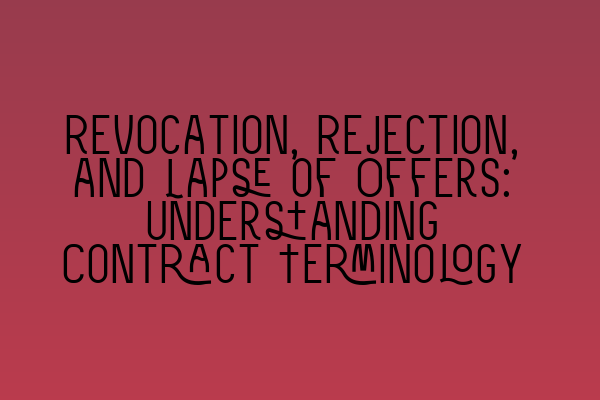Revocation, Rejection, and Lapse of Offers: Understanding Contract Terminology
As a solicitor, it is crucial to have a comprehensive understanding of contract terminology as it forms the basis of legal agreements. In this article, we will delve into the concepts of revocation, rejection, and lapse of offers, which are essential elements of contract law.
1. Revocation of Offers
An offer is a proposal made by one party to another with the intention to create a legal relationship. However, there are situations where an offer can be revoked or withdrawn before it is accepted. It is important to note that an offer can be revoked any time before it is accepted, regardless of whether there is a specified time limit for acceptance.
For example, imagine you receive an offer from a potential client to provide legal services. If you later decide to withdraw or revoke your offer, you must communicate this revocation effectively to the other party. This means providing clear and unequivocal notice of revocation.
It is important to understand that revocation of an offer is not effective until it is communicated to the offeree. Therefore, it is recommended to communicate the revocation in writing or through a reliable method to ensure that it is received by the offeree in a timely manner.
If the offer is revoked and the offeree is unaware of the revocation, they may still accept the offer, leading to a possible dispute. Hence, prompt communication is essential to avoid any misunderstanding or potential legal issues.
2. Rejection of Offers
In contract law, rejection refers to the refusal of an offer by the offeree. Once an offer has been rejected, it becomes null and void. This means that the offer cannot be accepted after it has been rejected by the offeree.
Similar to revocation, rejection of an offer must be communicated to the offeror for it to be effective. It is advisable to reject an offer in writing or through a reliable method to ensure clarity and eliminate any confusion.
If an offer is rejected, the offeror is no longer bound by the terms of the offer, and negotiations will need to start afresh if both parties are still interested in entering into a contract.
3. Lapse of Offers
An offer can also lapse or expire due to various reasons. One common reason for the lapse of an offer is the expiration of the stipulated time limit for acceptance. If the offer specifies a deadline for acceptance, and the offeree fails to accept before the deadline, the offer lapses automatically.
Another circumstance that leads to the lapse of an offer is the death or incapacity of either party involved in the offer. If the offeror or offeree passes away or becomes incapacitated before the offer is accepted, the offer is no longer valid.
Furthermore, an offer can also lapse due to the occurrence of an event or act that renders the contract impossible or illegal. For example, if the subject matter of the offer is destroyed or if a law is passed that prohibits the fulfillment of the offer, the offer automatically lapses.
It is crucial to be aware of the expiration dates and potential circumstances that can lead to the lapse of an offer. Keeping track of these dates and events will help ensure that your legal agreements are valid and enforceable.
In conclusion, understanding the concepts of revocation, rejection, and lapse of offers is fundamental to grasp the intricacies of contract law. As a solicitor, being well-versed in contract terminology will enable you to provide accurate legal advice and ensure that your clients’ interests are protected.
If you found this article informative, you may be interested in reading these related articles:
– Unveiling Real-Life Case Studies: Insights into Legal Practice and Decision-Making
– Exploring Solicitor Salaries in the UK: Average Earnings and Factors Affecting Income
– Mastering Client Relationship Management: Skills for Solicitors to Enhance Trust and Loyalty
– Pursuing a Law School Education in the UK: Choosing the Right Path for Your Future
– Securing Training Contracts: A Roadmap to Becoming a Solicitor
We hope you found this article enlightening and informative. For any legal assistance or further queries, please do not hesitate to reach out to SQE Contract Law. Our team of experienced solicitors is here to help you.
